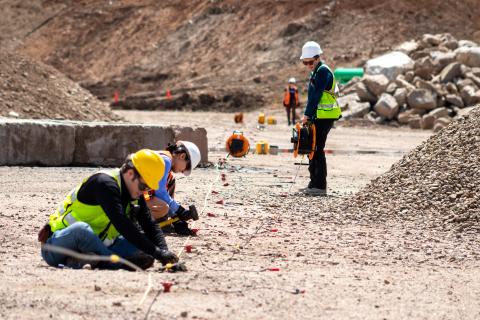All Categories
Featured
Table of Contents
Geophysical Methods in Hazelmere WA 2021
Other possible geophysicist majors that aren't geophysics or geoscience consist of: Climatic sciences and meteorology Chemical and physical oceanography Earth science Environmental science Hydrology and water resources science Materials science By making any geophysicist degree, and by taking the needed geology courses, you must qualify for an entry-level position as a geoscientist or geophysicist.
Ultimately, students need to learn: a branch of geology that looks at the different aspects of minerals, including chemical structure, internal crystal structure, and physical properties. the research study of rocks and the procedures and conditions that form and change them gradually. There are a couple of subdivisions in this branch of geology, consisting of igneous, metamorphic, and sedimentary rocks.

This field analyzes structural rock features such as cleavage, faults, joints, and small folds. They must also learn the computer system skills essential to: evaluate information develop digital models and maps operate geoscientists' software Students should likewise benefit from all chances to acquire real-world experience. Aspiring geophysicists ought to anticipate to hang around learning: in the classroom in the field in laboratories Obviously, skills taught in the class are really essential for striving geophysicists.
Geological And Geophysical Surveys in South Guildford Australia 2021
For instance, geoscientists invest a lot of their time outside when operating in the field, so they need to possess "outside abilities" like outdoor camping and running boats, aircraft, and other cars. Since they spend a lot time in remote areas, it's necessary that geophysicists also have the physical endurance to bring essential equipment on their walkings to locations of study.
The task uses: a high average and leading profits a high rate of personal complete satisfaction amongst geophysicists low work stress favorable job outlook More information on revenues capacity and job outlook is detailed below. For students seeking to land an entry-level function as a geoscientist or geophysicist, it takes four years, or the time required to complete a bachelor's degree in geophysics or an associated discipline.
Some research positions in geophysics need doctoral degrees. Also, if you prepare to teach at a college or university, you must make a Ph - Geophysicist Job Description: Salary, Duties, & More in Bateman Western Australia 2023. D. in geophysics or a related field. The time it takes to earn a Ph. D. varies by organization and program, but it usually takes 4 to six years beyond the bachelor's degree.
Geophysical Survey - Mining Fundamentals in Champion WA 2020
A lot of employers need candidates to have a bachelor's degree in geophysics or a carefully related discipline for all entry-level positions. As an outcome, there's no way around the degree requirements for becoming a geophysicist.
Currently, 31 states require licensing for geologists, although licensing is not constantly needed, particularly for entry-level work. The states that do issue licenses use the Fundamentals of Geology Exam (FGE), which is administered through the National Association of State Boards of Geology (ASBOG). Now that you understand which degree for geophysicist tasks you need, you'll need to land a task, and it is essential to find out how much cash you can make in this career.
According to BLS, the average yearly wage for geoscientists is $93,580. According to BLS, particular markets provide higher salaries for geoscientists, and in some cases, they provide higher-than-average profits.
Geophysicist Salary in Warwick Australia 2022
In truth, mining, quarrying, and oil and gas extraction offers over $32,000 more annually than the average yearly wage for this occupation. The federal government, too, uses over $10,000 more in earnings than the national average for geoscientists. In addition to industry type, geographical place can significantly affect incomes for this occupation.

The top-paying states and their yearly mean earnings, according to the BLS, include: Texas $166,720 Oklahoma $149,630 Pennsylvania $120,590 Hawaii $120,130 Colorado $107,260 These five top-paying states use much greater wages than the average for this occupation. In truth, incomes for geoscientists in Texas are over $73,000 higher than the national average.
It needs to come as not a surprise that the majority of these high-paying locations are in Texas and Oklahoma, however some are discovered in California, Louisiana, and Colorado. The leading 10 highest-paying metro locations for geoscientists are: Houston-The Woodlands-Sugar Land, Texas: $188,400 Tulsa, Oklahoma: $186,490 Midland, Texas: $167,040 Odessa, Texas: $147,080 Oklahoma City, Oklahoma: $145,350 Bakersfield, California: $130,080 Urban Honolulu, Hawaii: $124,470 New Orleans-Metairie, Louisiana: $121,030 Washington-Arlington-Alexandria, DC, VA, MD, WV: $120,180 Denver-Aurora-Lakewood, Colorado: $116,910 For some geoscientists and geophysicists, residing in a metro city is not as enticing as living in a smaller community.
Table of Contents
Latest Posts
Geophysical And Geotechnical Assessment in Mount Hawthorn Western Australia 2020
Geophysicist Bob Embley: Ocean Exploration Careers in Alexander Heights Oz 2022
Geophysical Surveys: Definition & Methods in Woodlands Western Australia 2021
More
Latest Posts
Geophysical And Geotechnical Assessment in Mount Hawthorn Western Australia 2020
Geophysicist Bob Embley: Ocean Exploration Careers in Alexander Heights Oz 2022
Geophysical Surveys: Definition & Methods in Woodlands Western Australia 2021